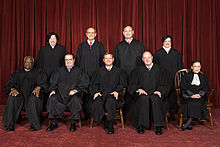| Smith v. United States | |
|---|---|
 | |
| Argued November 6, 2012 Decided January 9, 2013 | |
| Full case name | Smith v. United States |
| Docket no. | 11-8976 |
| Citations | 568
U.S. 106 (
more) 133 S. Ct. 714; 184
L. Ed. 2d 570 |
| Argument | Oral argument |
| Case history | |
| Prior |
|
| Holding | |
| 9-0 in favor of United States. The burden of proof remains on the defendant to prove withdrawal from a conspiracy. | |
| Court membership | |
| |
| Case opinion | |
| Majority | Written by Justice Scalia |
Smith v. United States, 568 U.S. 106 (2013), was a case decided by the Supreme Court of the United States of America. [1] The case was argued on November 6, 2012, and decided on January 9, 2013. [2]

Question of the Case
When a group has been charged with drug conspiracy, and several key members of the group claim they withdrew from the conspiracy at a point in time that would call into question the statute of limitations, is it the role of the government to prove that the drug conspiracy continued in a way that nullifies the statute of limitations? [1]
Facts of the case
There were six men, convicted through trial of several charges, including violations of the RICO act and drug conspiracy. [1] The specific statutes are 21 U.S.C. § 846 and 18 U.S.C. § 1962(d), where the prior regards attempt and conspiracy, and the latter regards prohibited activities. [2] [3] [4] The statute used in defense of Smith was 18 U.S.C. § 3282. [5] The case had been heard by the District of Columbia Circuit Court, which held that Smith should be convicted so long as the government had proven beyond a reasonable doubt the existence of conspiracy and Smith's involvement. [2] The court held that the jury should rule in favor of Smith if he proves that he withdrew from the conspiracy at a time appropriate to the statute of limitations, as the burden of proof was on Smith if the government proved his involvement in the conspiracy. [2]
Decision
In a unanimous decision, the court, with the majority opinion written by Antonin Scalia sided against Smith. [1] The court created a new precedent that presumes involvement in a conspiracy if the statute of limitations defense is used, shifting the burden of proof to the defendant. [2] The court determined that it is the burden of the defendant to prove that they withdrew from a conspiracy, and that they did so past the statute of limitations. [2] The Due Process Clause of The Constitution of the United States of America is not violated by putting the burden of proof on the defendant. [2] Though argued by the defendant, the court concluded that Mullaney v. Wilbur does not apply in this case. [6] Because Smith took part in a conspiracy, the defense of withdrawal is to be proven by the defendant, as it is assumed that he was a part of the conspiracy throughout. [6] The court also decided that innocence is not determined solely by withdrawing from a conspiracy, as withdrawal has to coincide with the statute of limitations. [2] To further understand the burden of proof on the government in accordance with the ruling, see Dixon v. United States. [7]
References
- ^ a b c d "Oyez, Smith v. United States". www.oyez.org. Retrieved October 4, 2018.
- ^ a b c d e f g h Smith v. United States, 568 U.S. 106 (2013).
- ^ 21 U.S.C. § 846.
- ^ .
- ^ 18 U.S.C. § 3282.
- ^ a b "Opinion analysis: When a defense is just a defense - SCOTUSblog". SCOTUSblog. January 14, 2013. Retrieved November 29, 2018.
- ^ Dixon v. United States, 548 U.S. 1 (2006).
External links
- Text of Smith v. United States, 568 U.S. 106 (2013) is available from: Justia Oyez (oral argument audio) Supreme Court (slip opinion) (archived)